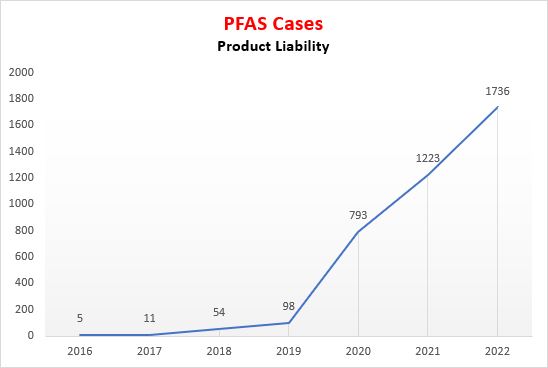Litigation concerning manmade chemicals known as PFAS (Per- and polyfluorinated alkyl substances) is set to intensify in 2023 as a nationwide MDL—comprised of thousands of cases brought by individual plaintiffs, state governments, and local municipalities against several PFAS manufacturers and distributors—is set to kick off, with the first bellwether trial expected this June. In preparation for a lengthy, knock-down, drag-out battle like other complex litigation involving public health, defense counsel for PFAS litigation would be wise to consider retaining experts now.
For years, increased scrutiny around the use of PFAS chemicals in many industrial products has driven product liability claims alleging that exposure to PFAS chemicals, resistant to breaking down in the environment, causes adverse health effects. And while PFAS bans and new restrictions around their use are taking effect in several states this year, we anticipate that disputes concerning the chemicals will likely continue to grow and branch out.
According to data in Lex Machina, product liability cases involving PFAS chemicals have grown exponentially year over year since 2019.

PFAS lawsuits involving claims of environmental contamination have flooded the courts, alleging negligence by PFAS industrial manufacturers and large-scale distributors of products containing PFAS. These cases have drawn a lot of ire in today’s awakened society, causing increasing attention to where PFAS are used. Most people in the U.S. have been exposed to PFAS as the chemicals have been and still are widely used in hundreds of everyday products, from cookware and takeout containers to dental floss and water-repellent gear. In fact, according to the National Institute of Health, PFAS chemicals have been found in the blood of 97% of Americans. So, imagine the broad reach of potential claims for supposed harm done by countless household products containing PFAS and the millions to billions of dollars in damages at stake for defendants. There is a growing trend around PFAS lawsuits alleging deceptive marketing and advertising practices and consumer protection violations. We have seen several cases in this first wave of litigation involving PFAS consumer goods filed in the past year, including lawsuits against cosmetic companies, the food packaging industry, and feminine hygiene products.
With so much headwind, what can defense counsel representing companies, manufacturers, and distributors of consumer products containing PFAS chemicals do to prepare for the likelihood of litigation? Consult with experts.
Highly credentialled experts can help counsel understand the landscape of potential liability claims in specific industries, navigate enforcement actions on the horizon, and be prepared to testify as needed.
A diverse team of experts could include:
- Environmental scientists who can analyze the extent and impact of PFAS saturation in nature (soil, water, and air) and help determine potential sources of PFAS
- Toxicologists who can identify exposure levels and evaluate their potential health effects
- Epidemiologists who can analyze medical records and data related to diseases and health conditions to examine causation
- Chemists who can speak to the chemical components of PFAS and how they behave in the environment
- Regulatory experts who understand federal and state regulations surrounding PFAS and the potential liability of companies
At WIT, we have significant expertise working on life sciences matters involving mass torts, product liability claims, and consumer protection concerns. For instance, we have worked with defense counsel and clients on matters involving ethylene oxide, a colorless gas mainly used in producing other chemicals said to be linked to the inadvertent production of PFAS chemicals.
Learn more about our teams of life sciences experts who are highly credentialled scientists, medical doctors, engineers, industry veterans, and former regulators. Contact us to learn how our top consulting and testifying experts can support your case.








